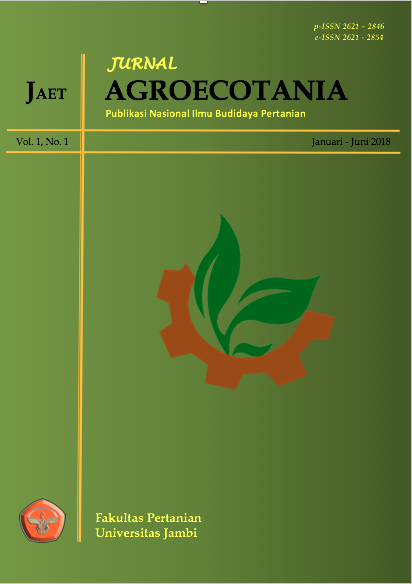RESPONS PERTUMBUHAN BIBIT KARET (Hevea brasiliensis Muell.Arg) SATU PAYUNG KLON PB 260 TERHADAP PEMBERIAN DECANTER SOLID PADA MEDIA TANAH BEKAS TAMBANG BATU BARA DI POLYBAG
DOI:
https://doi.org/10.22437/agroecotania.v1i1.5335Abstract
The management of the umbrella rubber plant of a clone PB 260 in the former mine is considered to be one of the main alternative solutions to overcome the unproductive lands with the provision of a solid decanter. This research was conducted at Teaching and Research Farm Faculty of Agriculture, University of Jambi from June to September 2017 with the aim to know the best decanter dose of rubber seed growth on the former land of coal mine in polybag. This research used a Completely Randomized Design (RAL) with 6 levels of treatment (a0) Without the solid decanter, (a1) 400 g/polybag, (a2) 500 g/polybag, (a3) 600 g/polybag, (a4) 700 g/polybag, (a5) 800 g/polybag. Each treatment consisted of 4 replications, and each replication consisted of 4 plants and 2 plants used as samples.Based on the result of this research, it can be concluded that the provision of solid decanter to the growth of rubber seedlings (Hevea brasiliensis Muell. Arg) one umbrella with soil media used for coal mining area gives better growth to diameter, number of leaf, dry weight of crown, and root dry weight than seed rubber without a solid decanter and generally a solid decanter treatment with a dose of 500 g / polybag showed improved rubber seed growth better than other treatments.
Keyword: rubber seedlings the first umbrella,coal mine, solid decanter.
Downloads
Downloads
Published
Versions
- 2018-07-30 (1)
- 2018-07-30 (1)
Issue
Section
License
Please find the rights and licenses in Indonesian EFL Research & Practice.
- License
The non-commercial use of the article will be governed by the Creative Commons Attribution license as currently displayed on Creative Commons Attribution-NonCommercial-ShareAlike 4.0 International License.
- Author’s Warranties
The author warrants that the article is original, written by stated author(s), has not been published before, contains no unlawful statements, does not infringe the rights of others, is subject to copyright that is vested exclusively in the author and free of any third party rights, and that any necessary written permissions to quote from other sources have been obtained by the author(s).
- User Rights
Indonesian EFL Research & Practice's spirit is to disseminate articles published are as free as possible. Under the Creative Commons license, Indonesian EFL Research & Practice permits users to copy, distribute, display, and perform the work for non-commercial purposes only. Users will also need to attribute authors and Indonesian EFL Research & Practice on distributing works in the journal.
- Rights of Authors
Authors retain the following rights:
- Copyright, and other proprietary rights relating to the article, such as patent rights,
- The right to use the substance of the article in future own works, including lectures and books,
- The right to reproduce the article for own purposes, provided the copies are not offered for sale,
- The right to self-archive the article.
- Co-Authorship
If the article was jointly prepared by other authors, the signatory of this form warrants that he/she has been authorized by all co-authors to sign this agreement on their behalf, and agrees to inform his/her co-authors of the terms of this agreement.
- Termination
This agreement can be terminated by the author or Indonesian EFL Research & Practice upon two months’ notice where the other party has materially breached this agreement and failed to remedy such breach within a month of being given the terminating party’s notice requesting such breach to be remedied. No breach or violation of this agreement will cause this agreement or any license granted in it to terminate automatically or affect the definition of Indonesian EFL Research & Practice.
- Royalties
This agreement entitles the author to no royalties or other fees. To such extent as legally permissible, the author waives his or her right to collect royalties relative to the article in respect of any use of the article by Indonesian EFL Research & Practice or its sublicensee.
- Miscellaneous
Indonesian EFL Research & Practice will publish the article (or have it published) in the journal if the article’s editorial process is successfully completed and Indonesian EFL Research & Practice or its sublicensee has become obligated to have the article published. Indonesian EFL Research & Practice may conform the article to a style of punctuation, spelling, capitalization, referencing and usage that it deems appropriate. The author acknowledges that the article may be published so that it will be publicly accessible and such access will be free of charge for the readers.










